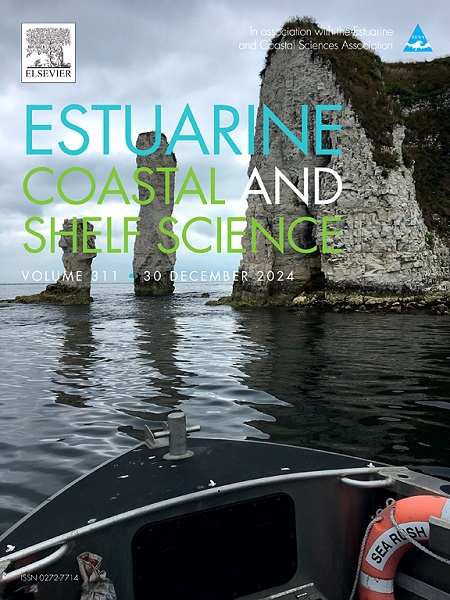Intertidal crab prey pulse export quantifies the importance of tidal wetland connectivity
IF 2.6
3区 地球科学
Q1 MARINE & FRESHWATER BIOLOGY
引用次数: 0
Abstract
A key value of saltmarshes is their role in providing trophic subsidies, notably in the form of prey pulses of crab zoeae (CZ). No studies to date, however, have investigated quantitatively the patterns between crab zoeae pulses and saltmarsh tidal connectivity in tropical estuaries. In this study, CZ densities were examined over successive tides and months using a zooplankton sampling pump to examine links between tidal fluctuations and pulses of CZ in a tropical Australian estuary with a complex of tidal saltmarshes, mangroves, and unvegetated flats. CZ densities were linked to spatially explicit information on tidal wetland inundation that was derived from Unattended-Aerial-Vehicle (UAV) Structure from motion (SfM) photogrammetry and two-dimensional hydrodynamic modelling. The study found that: (1) tidal connectivity is a key trigger to prey pulse export; (2) while tidal connectivity was critical in the export of CZ, not all tidal connections resulted in meaningful ecological connectivity; and (3) succulent saltmarsh was one of the tidal wetland types contributing to the export of CZ. Surprisingly, we reveal that not all succulent saltmarshes were uniformly participating in CZ export. These findings highlight the significance of quantitative eco-hydrological approaches to assess saltmarsh and tidal connectivity values. This study supports the need for management and restoration approaches to integrate a contextual understanding of the synergies between hydrology, ecology, and habitat heterogeneity. These data emphasise the need to move beyond generalisations that “similar” habitat type share similar ecological functions and should be managed equally.
潮间带蟹类猎物脉冲输出量化了潮汐湿地连通性的重要性
盐沼的一个重要价值是其在提供营养补助方面的作用,特别是以蟹类藻类(CZ)猎物脉冲的形式提供营养补助。然而,迄今为止,还没有任何研究对热带河口的蟹藻脉冲与盐沼潮汐连通性之间的模式进行定量研究。在这项研究中,使用浮游动物采样泵对连续潮汐和月份中的 CZ 密度进行了检测,以研究澳大利亚一个由潮汐盐沼、红树林和无植被滩涂组成的热带河口中潮汐波动与 CZ 脉冲之间的联系。CZ 密度与潮汐湿地淹没的空间信息相关联,潮汐湿地淹没的空间信息来自无人飞行器(UAV)的运动结构(SfM)摄影测量和二维水动力模型。研究发现(1) 潮汐连通性是猎物脉冲输出的关键触发因素;(2) 虽然潮汐连通性对 CZ 的输出至关重要,但并非所有潮汐连通性都能带来有意义的生态连通性;(3) 肉质盐沼是促进 CZ 输出的潮汐湿地类型之一。令人惊讶的是,我们发现并非所有肉质盐沼都一致参与了 CZ 的输出。这些发现凸显了采用定量生态水文方法评估盐沼和潮汐连通性价值的重要性。这项研究证明,管理和恢复方法需要结合对水文、生态和生境异质性之间协同作用的理解。这些数据强调,不能一概而论地认为 "相似 "的生境类型具有相似的生态功能,应该同等管理。
本文章由计算机程序翻译,如有差异,请以英文原文为准。
求助全文
约1分钟内获得全文
求助全文
来源期刊
CiteScore
5.60
自引率
7.10%
发文量
374
审稿时长
9 months
期刊介绍:
Estuarine, Coastal and Shelf Science is an international multidisciplinary journal devoted to the analysis of saline water phenomena ranging from the outer edge of the continental shelf to the upper limits of the tidal zone. The journal provides a unique forum, unifying the multidisciplinary approaches to the study of the oceanography of estuaries, coastal zones, and continental shelf seas. It features original research papers, review papers and short communications treating such disciplines as zoology, botany, geology, sedimentology, physical oceanography.

 求助内容:
求助内容: 应助结果提醒方式:
应助结果提醒方式:


